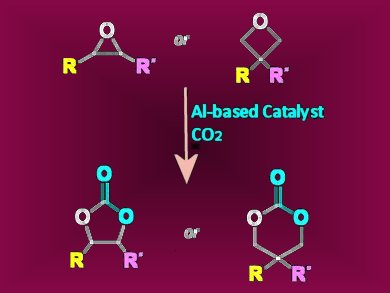Researchers at the Institute of Chemical Research of Catalonia, Tarragona, Spain, have developed an aluminum catalyst that can make highly functional organic carbonates from epoxides and carbon dioxide, thus providing an inexpensive and non-toxic alternative to pricier heavy metal catalysts.
The team used an aluminum complex of the amino triphenolate ligand scaffold, which they demonstrated has a turnover of 36000/h and can act on a wide range of substrates to generate functional carbonates using CO2 as a feedstock. The catalyst thus demonstrates a way to avoid petroleum derivatives as a feedstock as well as offering an effective way to generate useful cyclic or polycarbonate products.
Earlier catalysts for this type of conversion rarely exceed turnovers of 200/h. An approach offering 12000/h turnover was recently demonstrated with a magnesium-porphyrin complex, although these efforts were also limited to adding single functional groups. The current work far exceeds these turnovers and opens up a cheap way to generate a versatile array of compounds from epoxides and oxetanes.
- A Powerful Aluminum Catalyst for the Synthesis of Highly Functional Organic Carbonates,
Christopher J. Whiteoak, Nicola Kielland, Victor Laserna, Eduardo C. Escudero-Adán, Eddy Martin, Arjan W. Kleij,
J. Am. Chem. Soc. 2013.
DOI: 10.1021/ja311053h



